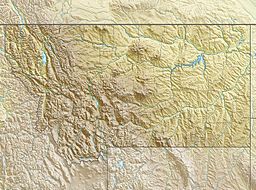Big Baldy Mountain (Montana) facts for kids
Quick facts for kids Big Baldy Mountain |
|
|---|---|
| Mount Baldy | |
| Highest point | |
| Elevation | 9,181 ft (2,798 m) NAVD 88 |
| Prominence | 3,557 ft (1,084 m) |
| Geography | |
| Location | Judith Basin County, Montana, U.S. |
| Parent range | Little Belt Mountains |
| Topo map | USGS Yogo Peak |
Big Baldy Mountain is the highest point in the Little Belt Mountains in Montana. It stands tall in Judith Basin County. This impressive mountain reaches a height of 9,181 feet (about 2,800 meters). Many people in the area simply call it Mount Baldy.
Contents
How Big Baldy Mountain Was Formed
Scientists and local people have some interesting ideas about how Big Baldy Mountain came to be. They think it was formed many thousands of years ago by hot, melted rock called magma. This magma was deep inside the Earth but never quite reached the surface.
Magma and Volcano-like Features
Even though Big Baldy Mountain isn't an active volcano today, satellite pictures show some cool features. You can see craters and other shapes that make it look like there might have been volcanic activity long ago. Some parts even look like old lava trails or spills!
The Rocky Mountains Connection
When the huge Rocky Mountains were forming, the Little Belt Mountains (where Big Baldy is) were also changing. This happened because of plate tectonics. That's when giant pieces of the Earth's outer layer slowly move around. During this time, magma moved very close to the surface, creating bumps and changes in the land.
A Bulge of Magma
One idea is that a big bulge of volcanic magma and gases pushed up the ground where Big Baldy Mountain now stands. The magma itself didn't burst out like a volcano erupting. However, some volcanic gases might have escaped. When the magma below eventually moved away, it left behind sunken areas, which are now the craters we see.
Why "Baldy"?
The big bulge of rock stayed, forming Big Baldy Mountain. Because of how it was created, the very top of the mountain doesn't have much plant life. This lack of trees and plants might be why it got its name, "Baldy"!
 | Aurelia Browder |
 | Nannie Helen Burroughs |
 | Michelle Alexander |


